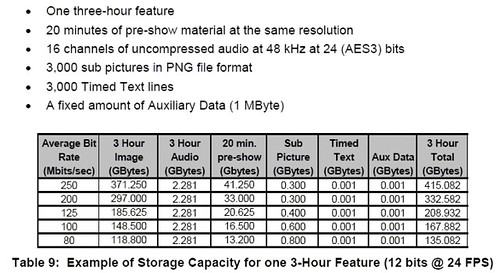Digital cinema: movie distribution
04 Mar 2006I wrote about digital cinema earlier. I want to focus now on the distribution of movies to theatres.
FILESIZE OF A MOVIE
The movie’s video signal is compressed and encrypted into a bitrate of max 250 Mbps, which translates in 31.25 MB/second or 112.50 GB/hour footage. So a ‘short’ 90-minute movie is something like 170GB, and a 2h30 movie, with some audio thrown in, is more like 300 GB. The estimates from the DCI specification are even higher: around 140 GB per hour running length (video, audio and subtitles together) or around 38 MB/s.
DIGITAL TRANSPORT
Kinepolis currently has 21 theatres that are equiped for digital cinema. So if a new movie comes out they need to transport 21 copies of 300GB to each of those. Imagine somewhere in the future a large distributor has to distribute 500 copies, preferably in less than a day. What are the options?
Start situation: 1 compressed file in DCDM format (compressed and encrypted – so safe to send)
- External hard disk </p>
- Low-budget: send a LaCie Big Disk drive (500 euro/600GB – 1,5kg). Although, they are not exactly 100% reliable. </p>
:

Mid-budget: send 2 drives in RAID-1 configuration (mirrored), such as the Lacie Two Big (1000 euro/500GB mirrored S-ATA – 2,5kg) or the Netgear/Zetera Storage Central SC101 (700 euro/400GB mirrored ATA) </p> - These disks are USB2.0 (max 216 GB/h), Firewire (max 160 or 320 GB/h) or Gigabit Ethernet (max 450GB/h). Actual throughput speeds will be 25 to 75% of these theoretical values. So copying the whole data onto the local movie theatre network will take 1 to 2 hours, and then it’s ready for projection. </p>
- Backup tape </p>
- DLT tape: Super DLTape II can store 300GB onto a 0,225kg tape, with speeds up to 32MB/s </p>
- LTO tape: LTO 3 can store 400GB and has speeds up to 80 Mbps. </p>
- Reading speed can go up to 32 MB/s (115 GB/h), so a bit slower than the hard disks. </p>
- HD-DVD/BluRay </p>
- HD-DVD has a capacity of 15GB/disk, BluRay 25GB/disk. This means a 200GB movie translates 8 to 14 disks. Might be a way to distibute the content, but I’m not too convinced it’s a handy one. </p>
- Broadband (Cable/ADSL) </p>
- Imagine transport via network instead of magnetic carrier. Every theatre has a broadband connection. Max speeds in Belgium are around 10Mbps download (4,5GB/h). So downloading a 200GB movie file would take 2 full days. That’s too slow. </p>
- Fast Ethernet </p>
- If every theatre had 100Mbps download speed, would that make network download feasible? That adds up to 45GB/h, download a full movie in 5 hours, or -let’s be realistic- 8 hours. That’s OK. Actually, if there was only 1 theatre, that would be OK. But if 21 deliveries have to be made at the same time, and they all download from one location, that adds up to 21 x 100 Mbps or 2,1 Gbps. That’s more bandwidth than most hosts can handle. Let alone 500 simultaneous downloads. </p>
- Fast Ethernet + BitTorrent </p>
- But if the source host only serves as a BitTorrent seeder, and the other downloaders can serve as peers for each other, it should be possible to deliver the same content to each theatre within 8 hours. Looking at how close Hollywood is looking at BitTorrent, this should be an evident choice.
Since current movie distribution (printing on 35mm film) costs between $1500 and $3000 per copy, any of the above methods is way cheaper.

